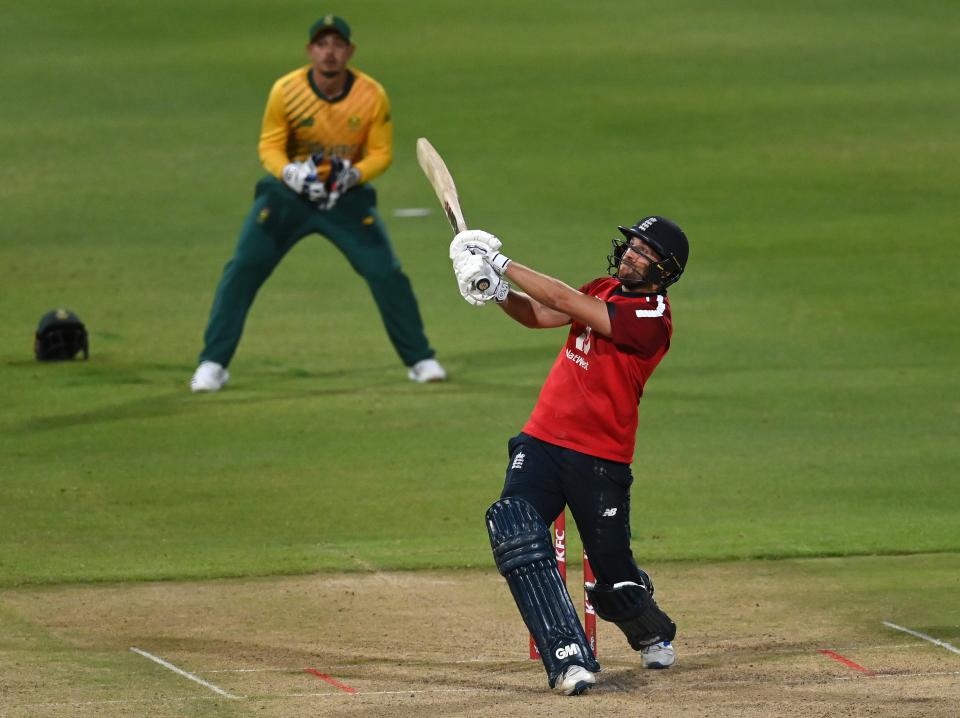Dawid Malan exhibits incredible consistency in most volatile of formats as England down South Africa yet again

Another chase, another win. England, with a comprehensive nine-wicket victory in the third T20 with 14 balls to spare, confirmed a 3-0 sweep of South Africa with their most ruthless display of the series.
It was by no means a complete performance. They were dismantled with the ball in hand, lambs to the slaughter overseen by Rassie van der Dussen (74* off 32) and Faf du Plessis (53*), the pair combining for 127, a new record for the fourth wicket in the format for the Proteas. But even a target of 192 and that late thrashing was not enough to stand in the way of Dawid Malan.
Maybe further down the line we could get scientists to dissect how Malan has enjoyed such incredible consistency in the most volatile format of the most volatile of sports. The 10 scores over 50 in 19 innings – of which this half-century, from 26 deliveries, was his fastest – and the career strike rate of 144, which was eclipsed by the 210 he was hitting at on Tuesday night at Newlands.
For now, though, here was a sublime 99 off 47 deliveries that surely sets him in stone into the most competitive XI going. He put Jos Buttler’s unbeaten 67 in the shade during a world record second-wicket partnership of 167. Yep, *that* Jos Buttler.
READ MORE: Malan’s hometown heroics seal series win
On 88, with 12 needed for the win, a second T20 century was on for Malan. Alas, he could only manage 11 to finish one short.
He could not be too disappointed. He successfully stuffed talk of being a slow starter down the throats of those who say so – justifiably – with 14 off his first three legal deliveries. And, as is the way when the game moves to your beat, there was good fortune: an over-turned LBW decision on 16, a botched run out from Quinton de Kock that should have had him run out on 36.
While Malan's place at next winter's T20 World Cup is more than assured, Eoin Morgan sought further clarity around him by announcing an unchanged line-up for the second time. Only 11 of the official 15-man squad have seen action over the last five days. Consistency of selection remains key for this management group in the pursuit of what Morgan called “complete transparency in their roles”.
So, too, is the need to play out a variety of different situations. Thus, when the toss was lost on a Newlands pitch that was used in the first T20i on Friday, England had a chance to test themselves batting second on a worn surface that would present a different challenge to the previous two wins. Of course, that isn't quite how this one panned out.
The scale of that challenge ramped up just over the halfway stage of South Africa’s innings. Any early impetus in the host’s batting was curbed by the loss of the top three for just 64. The wicket of De Kock, always vital, went to Chris Jordan for the third time this series – across just seven balls and for six runs – to take him out in front as England’s leading T20 wicket-taker with 66 dismissals.
But the Proteas got a hold of themselves, as van der Dussen and du Plessis slapped them out of their slumber, crashing 84 from the final five overs. The former was the chief aggressor, reaching his half-century from just 23 balls, brought up with a 22-run blitz against Jofra Archer, handing the 25-year old his most expensive over in all T20s played in his last action of 2020.
The striking would continue right to the end, van der Dussen hitting the last two of his five sixes in the final over (there were also five fours), assisted by a more measured approach from du Plessis. The former Proteas captain admired the last six deliveries from the nonstriker’s end nursing his 52 from 37.
As satisfying as this win was, England will be concerned by that late assault. They have never conceded more in the final five overs and, certainly to the eye, have rarely looked so clueless when attempted yorkers were sailing into the empty stands. Death bowling requires precision to nail exactly what you want and the nerve to try something different if things aren’t going your way. Both were lacking.
As ever, no matter the white-ball format, the batting is in rude health. There were 107 required off the final 60 before 40 were taken off two overs to ensure the game was brought home with a waltz rather than a scamper.
Things may have been different had the Proteas been able to call on their marquee quick Kagiso Rabada who is nursing a right abductor injury that has ruled him out of the ODI series to follow. His replacement, Lutho Sipamla, was carted for 21 in his second over.
The only blemish in the second-half was another failure for Jason Roy, trapped LBW by Anrich Nortje. He did pick up his top score (16) and hit his first six of the series, but it feels almost unfair to put too much stock in either of those given the tough year he has endured. He remains a query in a batting line-up of certainties.

 Yahoo Finance
Yahoo Finance 